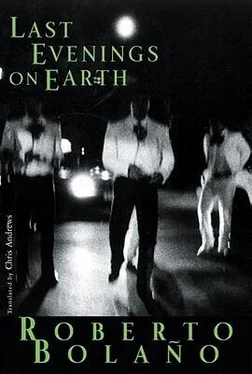The reception desk is manned by a short guy with teeth like a rabbit. He's young and seems friendly. He recommends a restaurant near the hotel. B's father asks if there's somewhere lively nearby. B understands what his father means. The receptionist doesn't. A place with a bit of action, says B's father. A place where you can find girls, says B. Ah, says the receptionist. For a moment B and his father stand there, without speaking. The receptionist crouches down, disappearing behind the counter, and reappears with a card, which he holds out. B's father looks at the card, asks if the establishment is reliable, then extracts a bill from his wallet, which the receptionist catches on the fly.
But after dinner, they go straight back to the hotel.
The next day, B wakes up very early. As quietly as possible he takes a shower, brushes his teeth, puts on his swimsuit and leaves the room. There is no one in the hotel dining room, so B decides to go out for breakfast. The hotel is on a street that runs straight down to the beach, which is empty except for a boy renting out paddle boards. B asks him how much it costs for an hour. The boy quotes a price that sounds reasonable, so B hires a board and pushes off into the sea. Opposite the beach is a little island, toward which he steers his craft. At first he has some trouble, but soon he gets the hang of it. At this time of day the sea is crystal clear and B thinks he can see red fish under the board, about a foot and half long, swimming towards the beach as he paddles toward the island.
It takes exactly fifteen minutes for him to get from the beach to the island. B doesn't know this, because he is not wearing a watch, and for him time slows down. The crossing seems to last an eternity. At the last minute, waves rear unexpectedly, impeding his approach. The sand is noticeably different from that of the hotel beach; back there it was a golden, tawny color, perhaps because of the time of day (though B doesn't think so), while here it is a dazzling white, so bright it hurts your eyes to look at it.
B stops paddling and just sits there, at the mercy of the waves, which begin to carry him slowly away from the island. By the time he finally reacts, the board has drifted halfway back. Having ascertained this, B decides to turn around. The return is calm and uneventful. When he gets to the beach, the boy who rents out the boards comes up and asks if he had a problem. Not at all, says B. An hour later B returns to the hotel without having had breakfast and finds his father sitting in the dining room with a cup of coffee and a plate in front of him on which are scattered the remains of toast and eggs.
The following hours are hazy. They drive around aimlessly, watching people from the car. Sometimes they get out to have a cold drink or an ice cream. In the afternoon, on the beach, while his father is stretched out asleep in a deck chair, B rereads Gui Rosey's poems and the brief story of his life or his death.
One day a group of surrealists arrives in the south of France. They try to get visas for the United States. The north and the west of the country are occupied by the Germans. The south is under the aegis of Pйtain. Day after day, the U.S. consulate delays its decision. Among the members of the group are Breton, Tristan Tzara, and Pйret, but there are also less famous figures. Gui Rosey is one of them. In the photo he has the look of a minor poet, thinks B. He is ugly, he is impeccably dressed, he looks like an unimportant civil servant or a bank teller. Up to this point, a few disagreements, but nothing out of the ordinary, thinks B. The surrealists gather every afternoon at a cafй by the port. They make plans and chat; Rosey is always there. But one day (one afternoon, B imagines), he fails to appear. At first, he isn't missed. He is a minor poet and no one pays much attention to minor poets. After a few days, however, the others start to worry. At the pension where he is staying, no one knows what has happened; his suitcases and books are there, undisturbed, so he clearly hasn't tried to leave without paying (as guests at pensions on the Cote d'Azur are prone to do). His friends try to find him. They visit all the hospitals and police stations in the area. No one can tell them anything. One morning the visas arrive. Most of them board a ship and set off for the United States. Those who remain, who will never get visas, soon forget about Rosey and his disappearance; people are disappearing all the time, in large numbers, and they have to look out for themselves.
That night, after dinner at the hotel, B's father suggests they go find a bit of action. B looks at his father. He is blond (B is dark), his eyes are grey and he is still in good shape. He looks happy and ready to have a good time. What sort of action? asks B, who knows perfectly well what his father is referring to. The usual kind, says B's father. Drinking and women. For a while B says nothing, as if he were pondering a reply. His father looks at him. The look might seem inquisitive, but in fact it is only affectionate. Finally B says he's not in the mood for sex. It's not just about getting laid, says his father, we'll go and see, have a few drinks and enjoy ourselves with some friends. What friends, says B, we don't know anyone here. You always make friends when you're out for a ride. The expression "out for a ride" makes B think of horses. When he was seven his father bought him a horse. Where did my horse come from? asks B. This takes his father completely by surprise. Horse? he asks. The one you bought me when I was a kid, says B, in Chile. Ah, Hullabaloo, says his father, smiling. He was from the island of Chiloй, he says, then after a moment's reflection he starts talking about brothels again. The way he talks about them, they could be dance halls, thinks B. Then they both fall silent.
That night they don't go anywhere.
While his father is sleeping, B goes out onto the terrace to read by the swimming pool. There is no one there apart from him. The terrace is clean and empty. From his table B can see part of the reception area, where the receptionist from the night before is standing at the counter reading something or looking over the books. B reads the French surrealists, he reads Gui Rosey. To tell the truth, Gui Rosey doesn't interest him much. He is far more interested in Desnos and Eluard, and yet he always ends up coming back to Rosey's poems and looking at his photo, a studio portrait, in which he has the air of a solitary, wretched soul, with his large, glassy eyes and a dark tie that seems to be strangling him.
He must have committed suicide, thinks B. He knew he was never going to get a visa for the States or Mexico, so he decided to end his days then and there. B imagines or tries to imagine a town on the Cote d'Azur. He still hasn't been to Europe. He has been all over Latin America, or almost, but he still hasn't set foot in Europe. So his image of a Mediterranean town is derived from his image of Aca-pulco. Heat, a small, cheap hotel, beaches of golden sand and beaches of white sand. And the distant sound of music. B doesn't realize that there is a crucial element missing from this scene's soundtrack: the rigging of the small boats that throng the ports of all the towns on the Mediterranean coast, especially the smaller ones. The sound of the rigging at night, when the sea is as still as a mill pond.
Suddenly someone comes on to the terrace. The silhouette of a woman. She sits down at the farthest table, in a corner, near two large urns. A moment later the receptionist appears, bringing her a drink. Then, instead of going back to the counter, he comes over to B, who is sitting by the edge of the pool, and asks if he and his father are having a good time. Very good, says B. Do you like Acapulco? asks the receptionist. Very much, says B. How was the San Diego? asks the receptionist. B doesn't understand the question. The San Diego? For a moment he thinks the receptionist is referring to the hotel, but then he remembers that the hotel is called something else. Which San Diego? asks B. The receptionist smiles: The club with the hookers. Then B remembers the card the receptionist gave his father. We haven't gone yet, he says. It's a reliable place, says the receptionist. B moves his head in a way that could mean almost anything. It's on Constituyentes, says the receptionist. There's another club on the avenue, the Ramada, but I wouldn't recommend it. The Ramada, says B, watching the woman's motionless silhouette in the corner of the terrace and the apparently untouched glass in front of her, between the enormous urns, whose shadows stretch and taper off under the neighboring tables. Best to steer clear of the Ramada, says the receptionist. Why? asks B, for something to say, although he has no intention of visiting either place. It's not reliable, says the receptionist, and his bright little rabbit teeth shine in the semidarkness that has suddenly submerged the terrace, as if someone at reception had switched off half the lights.
Читать дальше












